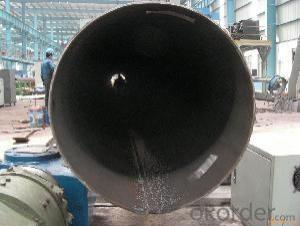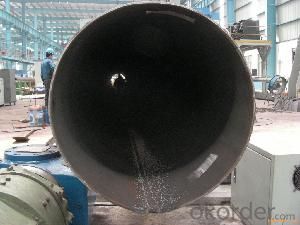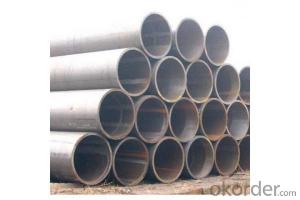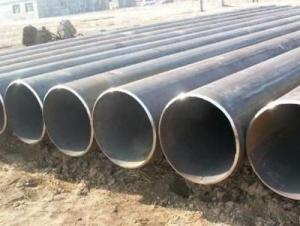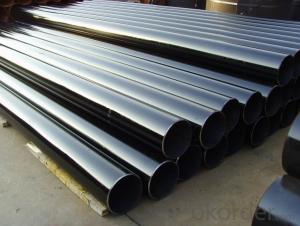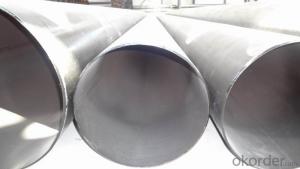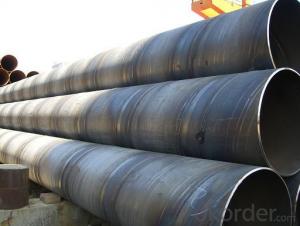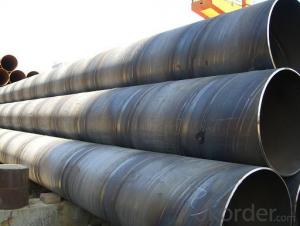LSAW STEEL PIPE 6'' -48'' CARBON API 5L
- Loading Port:
- China Main Port
- Payment Terms:
- TT OR LC
- Min Order Qty:
- -
- Supply Capability:
- -
OKorder Service Pledge
OKorder Financial Service
You Might Also Like
Packaging & Delivery
Packaging Detail: | Normal exporting packing,in container or bulk vessel or as per clients' request |
Delivery Detail: | 2 months after confimed contract |
Specifications
Large Diameter API 5L X70 PSL2 LSAW Steel Pipe
Grade: X42, X46, X50, X52, X60, B, C
OD: 1.5"-28"
WT: SCH10-SCH160
Brand:TPCO
Large Diameter API 5L X70 PSL2 LSAW Steel Pipe
Specifications:
u Standard: API 5L
u Grade: B, C, X42, X46, X50, X52, X56, X60, X65, X70, X80
u OD: 1.5"-28"
u WT: SCH10-SCH160
u Length: 5-12m
u Ends Finish: plain end, bevel end, grooved end
u Surface Treatment: bare, black varnished, oiled finish, red color, anti-corrosion, 3PE, FBE or epoxy coating
u Technique: hot rolled or cold drawn
u Application: api 5l steel pipe for conveying oil, water, gas
u Invoicing: based on theoretical weight or actual weight
u Payment Terms: L/C at sight, T/T or Western Union
u Trade Terms: FOB, CFR, CIF
u Certification: ABS manufacturing assessment, ABS design assessment, API 5CT, API 5L, DNV manufacturer certificate, ISO9001 quality management system certificate, ISO14001 environment management system certificate, GB/T28001 occupational health and safety management system certificate, A1 class manufacturing license of special equipment certificate, CCS, GL, LR, SGS, TüV, PDE
- Q: How are steel pipes used in the agricultural irrigation systems?
- Steel pipes are commonly used in agricultural irrigation systems to transport water from a water source, such as a well or reservoir, to the fields. They are durable and can withstand high pressure, making them suitable for long-distance water transportation. Steel pipes are also resistant to corrosion and can withstand various weather conditions, ensuring reliable and efficient water distribution for crop irrigation.
- Q: The difference between 12Cr1MoVG alloy steel tube and 15CrMo
- 15CrMo is a steel Pearlite Heat-resistant steel, has high heat resistance at high temperature (b = 440MPa) and antioxidant activity, and has certain ability of anti hydrogen corrosion. Because of the high content of Cr, C and other alloy elements in steel, the tendency of hardening of steel is obvious, and the weldability is poor.
- Q: What is the fatigue strength of steel pipes?
- The fatigue strength of steel pipes refers to their ability to withstand repeated cyclic loading without experiencing failure. It is a critical characteristic for pipes that are subject to dynamic or fluctuating loads, such as those used in the oil and gas industry, transportation infrastructure, or industrial applications. The fatigue strength of steel pipes can vary depending on several factors, including the steel grade, pipe dimensions, manufacturing process, surface conditions, and environmental factors. Steel pipes with higher tensile strength and toughness generally exhibit better fatigue resistance. The fatigue strength is typically determined through fatigue testing, which involves subjecting the pipes to cyclic loading until failure occurs. The results are then used to establish a fatigue curve or S-N curve, which represents the relationship between the applied stress amplitude and the number of cycles to failure. The fatigue strength is commonly expressed as the stress amplitude required to cause failure after a specific number of cycles, such as the stress amplitude at 10 million cycles (S-N10^7). It is important to note that fatigue strength is influenced by other factors, such as mean stress, surface finish, and loading frequency, which may need to be considered in specific applications. Overall, the fatigue strength of steel pipes is a crucial factor to consider in engineering design and maintenance, as it helps ensure the long-term integrity and reliability of the pipes under cyclic loading conditions.
- Q: How many meters per ton of steel tube?
- Formula of steel tube: (outside diameter wall thickness) * wall thickness *0.02466= per meter weight1000 divided by the weight per metre is how many meters per ton
- Q: What is the difference between steel pipes and concrete pipes?
- The main difference between steel pipes and concrete pipes lies in their composition and physical properties. Steel pipes are made from a combination of iron and carbon, which makes them strong, durable, and resistant to corrosion. Concrete pipes, on the other hand, are made from a mixture of cement, sand, and aggregates, giving them a solid structure and high compressive strength. In terms of installation, steel pipes are typically lighter and easier to handle, making them more convenient for transportation and installation. Concrete pipes, due to their weight and bulkiness, require heavy machinery or specialized equipment for handling and placement. Additionally, steel pipes have a smooth interior surface, which allows for efficient fluid flow and minimizes friction. Concrete pipes, on the contrary, have a rougher interior surface that can cause friction and impede the flow of fluids. When it comes to cost, steel pipes tend to be more expensive than concrete pipes, primarily due to the higher cost of raw materials and manufacturing processes involved. Both steel and concrete pipes have their specific applications and advantages. Steel pipes are commonly used in industries such as oil and gas, water supply, and construction, where strength and durability are crucial. Concrete pipes are often used in sewer systems, stormwater drainage, and culverts, where their high load-bearing capacity and resistance to chemical erosion make them suitable options.
- Q: What are the advantages of PVC pipe and galvanized steel pipe?
- This is different in different fields, in fact, the combination of PVC pipe and galvanized steel pipe becomes plastic steel pipe.The steel plastic pipe is in the internal and external combined with a layer of plastic pipe material and obtained a pipe, it has high mechanical strength, the steel pipe has the advantages of high impact resistance, and corrosion resistance of plastic material, has the advantages of high and low grade health fluid resistance and scaling.The steel pipe used by our company is produced by Benxi Steel, which is well known both at home and abroad. It has the advantages of low phosphorus, low sulfur and high mechanical performance. It can meet the requirements of users.
- Q: What are the advantages of using steel pipes in construction?
- There are several advantages of using steel pipes in construction. Firstly, steel pipes are highly durable and have a long lifespan, making them ideal for long-term projects. Secondly, steel pipes have a high strength-to-weight ratio, meaning they can support heavy loads without being bulky or cumbersome. Additionally, steel pipes are resistant to corrosion, which ensures their longevity and reduces maintenance costs. Moreover, steel pipes are adaptable and can be easily fabricated and customized to fit specific project requirements. Lastly, steel pipes are eco-friendly as they can be recycled, reducing waste and promoting sustainability in construction.
- Q: How do steel pipes handle thermal expansion?
- Steel pipes handle thermal expansion by expanding and contracting with changes in temperature. The high thermal conductivity of steel allows it to transfer heat quickly, preventing excessive expansion. Additionally, the flexibility of steel allows it to absorb the expansion and contraction without compromising the integrity of the pipe.
- Q: Is the seamless steel pipe used in the market hot or cold drawn?
- Small and medium-sized cold drawn and hot-rolled are many, large caliber is hot rolling, cold rolled spot less.
- Q: What are the different types of expansion joints used with steel pipes?
- There are several types of expansion joints commonly used with steel pipes, including bellows expansion joints, slip expansion joints, and flanged expansion joints. Bellows expansion joints are flexible connectors made of a series of convolutions that allow for axial, lateral, and angular movement. Slip expansion joints consist of two pipe sections with a sliding sleeve in between, allowing for limited axial movement. Flanged expansion joints are designed with flanged ends to provide flexibility and accommodate movement in all directions. These various types of expansion joints are used to absorb thermal expansion, vibration, and misalignment in steel pipe systems.
Send your message to us
LSAW STEEL PIPE 6'' -48'' CARBON API 5L
- Loading Port:
- China Main Port
- Payment Terms:
- TT OR LC
- Min Order Qty:
- -
- Supply Capability:
- -
OKorder Service Pledge
OKorder Financial Service
Similar products
Hot products
Hot Searches
Related keywords
